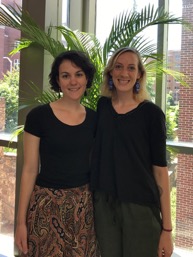2017 Seed Grant Awardees Abstracts
Gabrielle Purcell
Department of Anthropology
This project involves engaging members of the Eastern Band of Cherokee Indians (EBCI) in studying Cherokee foodways during the colonial period. I will examine how European-introduced foods moved through Cherokee town areas via Native trade and were adopted into Cherokee households before Europeans arrived, and whether these foods had an impact on traditional foodways and culture. Previous research indicates that the incorporation of these new foods did not significantly change Cherokee subsistence practices and culture. However, I believe that Cherokees assigned meaning to these foods within their own cultural context. Collaborating with modern Cherokees will aid in the analysis of these meanings and how Cherokees in the past negotiated the introduction of these foods as they were brought into the region.
Natives are historically portrayed as the victims of colonization, suffering from disease, warfare, and slave raiding. While these factors did impact Cherokees, they also continued to maintain homes, grow crops, and raise children, and persisted as communities in both their North Carolina homelands and in Oklahoma today. Rather than focusing on the ways external influences shaped Cherokee society, I will produce a fine-grained analysis that examines how Cherokee food producers negotiated these changes at the household level as they encountered European foods and material culture. Working with the EBCI community will produce a project that incorporates Cherokee input and worldviews while creating a final product that is something Cherokees find meaningful.
Shelby Rimmler and Sarah Shaughnessy
Department of Health Behavior
As the second largest pork producer in the United States, the hog industry remains integral to North Carolina’s economy. The majority of North Carolina’s hogs are raised in confined animal feeding operations (CAFOs), which produce a host of persistent problems that threaten the social, economic and physical health of the communities they inhabit. In North Carolina, CAFOs are densely clustered in low-income communities and communities in the state’s eastern coastal plain that have residents of color, where corporations are lured by pro-business tax incentives, lax environmental regulations, minimal oversight and little pushback from community residents. The Snow Hill community, a predominately African-American community in Sampson County, typifies this pattern.
Not only is Snow Hill situated in one of the densest concentrations of industrial hog operations, the community also hosts an active regional landfill which draws in approximately 5,400 tons of waste daily from municipalities across the state, including Chapel Hill. Snow Hill is also slated to be in the trajectory of the Atlantic Coast Pipeline.
This project uses photovoice, a community-based participatory research method, to document the environmental justice concerns of Snow Hill community residents and help build their capacity to address those concerns.
Rachel Wilbur
Department of Anthropology
Despite declines in infectious disease incidence in the U.S. over the past century, tuberculosis (TB) remains a concern within populations impacted by high rates of poverty, poor access to quality foods and health care, and plagued by systematic racism and historical trauma. Nationally the risk of TB is almost 10 times higher for Native Americans than for White Americans, and Native Americans are more likely to experience mortality during treatment. Alaska, a state with a high Native American/Alaska Native population, has the highest rate of TB of any state in the nation. Given these statistics, I am interested in how historical trauma and structural barriers influence TB susceptibility and disease response through epigenetic mechanisms within Alaska Native populations.
Willa Dong
Department of Health Behavior
In China, 45% of transgender women report high levels of depression – as compared to 1.8% among the general population. Preliminary studies have identified several factors associated with worse mental health outcomes, including relationship status, use of hormones, experiencing discrimination, and police harassment. However, the underlying mechanisms are not well-understood, limiting the design of appropriate interventions and tailored services.
The objectives of this project are to understand transgender women’s mental health priorities; identify Community Experts; and explore feasibility for conducting participatory research-based dissertation work. This award will allow me to build the relationships necessary for meaningful community partnership through traveling to China to meet with community members and leaders.

Sarah Tomlinson
Department of Music
Music appreciation programs for young people have historically relied on two assumptions. First, that music appreciation refers to specifically classical music and second, that music programs for young people implicitly do “good” work. These assumptions can be damaging because they imply the cultural superiority of classical music and its close association with composers of an exclusively white, European, and male identity over other genres. But music appreciation need not be encumbered by false assumptions. In fact, as an art form of creative engagement and self-expression, it is critical to introduce students to music in ways that empower them. The GCPR Graduate Student Seed Grant Award supports the collaborative implementation of a music appreciation curriculum at the Global Scholars Academy (GSA) in Durham that fosters in students a sense of their profound cultural, creative, and critical value.
The curriculum, Music Appreciation as a Practice of Freedom, engages elementary and middle school students as critical thinkers and introduces them to race, class, and gender diversity in music. Curricular units are organized thematically to include music from multiple genres, regions, and styles. The pilot curriculum, Music and Storytelling for kindergarten and first grade students, includes U.S. popular music, music of the African diaspora, Western classical music, and music from Latinx and Latin American communities. It features musical stories about young people and musicians who face discrimination on their paths to creative, intellectual, and individual success. Such work demonstrates that young people can transform music appreciation into a practice of freedom and adheres to GSA’s mission of cultivating students as “global” scholars. By working with teachers, students, and administrators at GSA, we show how awareness of music’s power and the power structures laden within its practice is instrumental to unleashing its strengths as creative, cultural, and liberatory expression in young people’s lives.



